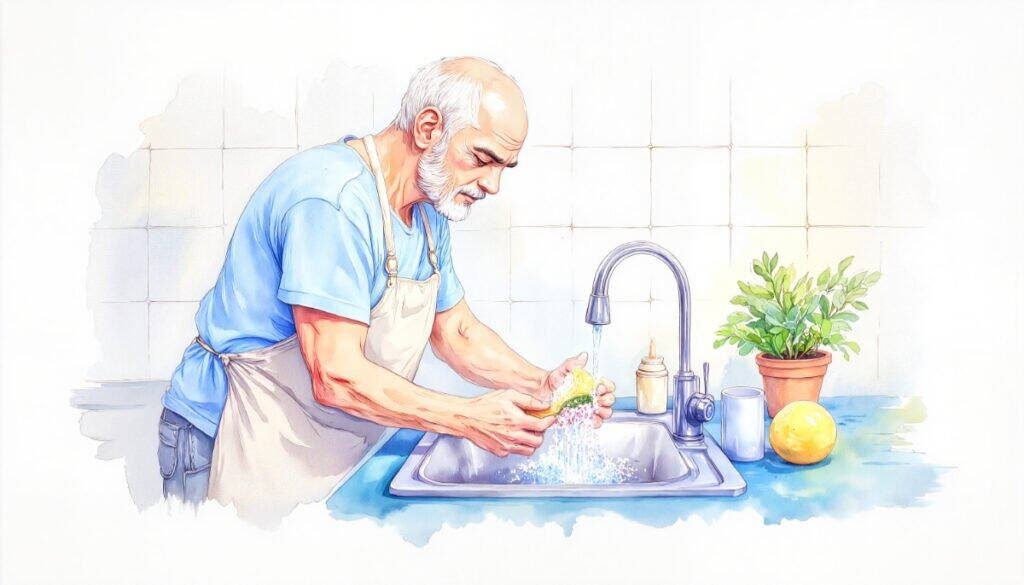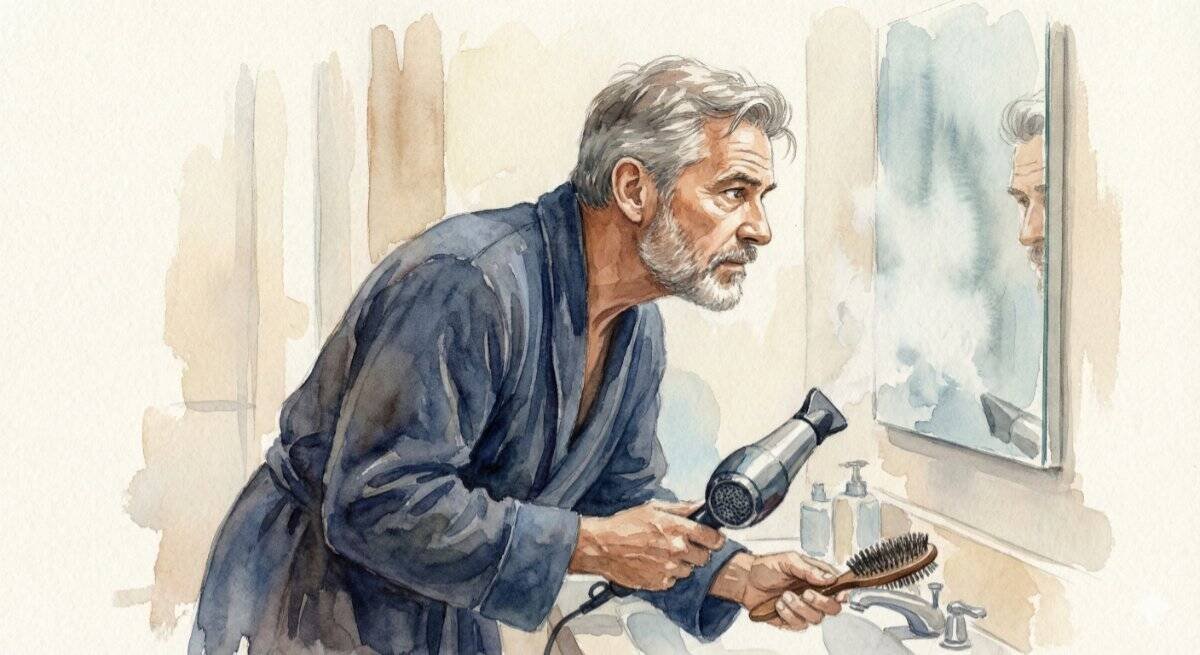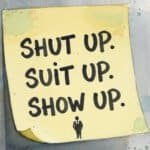Today’s Sunday morning walk to the store for toilet paper shouldn’t have been anything special. Yet somewhere between my apartment and the shop, I caught myself doing it again – that internal check-in that’s become increasingly familiar since, well, 552 days ago (yes, I’m counting, at least my Duolingo streak).
Am I dressed appropriately? Is my stubble intentional or just neglected? Did I acknowledge my neighbors properly? Am I balancing my hobby time with basic responsibilities?
Table of Contents
These silent questions arise more frequently now, these quiet audits of my own behavior and appearance that I never used to consciously perform. But maybe we all do this more than we admit.
Do you catch yourself doing these mental check-ins when no one’s watching?
When the Mirror Disappears
For twenty years, my wife provided that external perspective through conversation and daily interaction. Even on our off days, there was another person there: someone registering my existence, giving me a sense of how I was doing.
When that mirror disappears, through loss, divorce, kids leaving home, or retirement, something shifts. Living alone after major life changes makes you hyper-aware of yourself in weird ways. You become your own reality check.
Have you experienced this shift from external to internal validation after a major life change?

When she left Japan for America, green card in hand, her daughter waiting, something profound happened. I’m not ashamed to admit it broke me. Not permanently, not irreparably, but significantly enough that 550 plus days later, I’m still putting pieces back together in ways I hadn’t anticipated.
The Isolation Factor
Living in Japan with limited language skills adds another layer to all this. My interactions with locals stay pretty shallow: smiles, nods, and polite basic transactions. There’s no real opportunity for authentic connection or feedback beyond work relationships. My real thoughts are all in English, locked away from the Japanese-speaking world around me. This puts me in this weird mental bubble where self-assessment becomes even more internal, more isolated.
Do you feel like you’re living in a language or cultural bubble that affects how you see yourself?
Sunday Morning Inventory
So there I was, making a second trip out that morning (the store not opening until 10am), mentally checking boxes: Showered? Yes. Laundry started? Running now. Basic grooming? Passable. Apartment in reasonable order? Getting there.

This isn’t a pity party. I often prefer my own company and function well alone. Everything is fine. But something about major loss or change creates this need for periodic self-assessment, as if checking to make sure I haven’t missed something obvious in the absence of external feedback. Making sure that any noisy thoughts are kept calm enough for a double take.
What does your internal checklist look like when you’re alone?
The Deeper Questions
The shower, the laundry, the shopping: they’re just practical matters. The deeper check-in is about something else: Am I still functioning as a complete human? Am I maintaining balance? Have I retreated too far into hobby obsessions at the expense of other aspects of life?
Without regular external input, we can lose perspective on whether our choices are adjusting in a good way or just pulling away from life. Am I embracing authentic solitude or slowly becoming a hermit? Am I choosing simplicity or just avoiding the messier parts of life?
How do you tell the difference between healthy solitude and unhealthy isolation?
The Environmental Factor of Loss
Perhaps I should have moved after the split. New surroundings might have spared me the daily reminders of what once was and what now isn’t. Each corner of this apartment holds some memory, some established pattern that now leads nowhere.
But change affects us all differently. Some people need complete environmental shifts to heal; others need familiar ground to process transitions. Neither way is better than the other, they’re just different strategies for navigating loss.
When major changes hit, are you someone who needs new scenery or familiar ground?
The Necessary Check-In
However disciplined or resilient we consider ourselves, sometimes our knees buckle unexpectedly under the weight of change. Those moments of wobbling aren’t weakness, they’re signals prompting us to assess, adjust, and continue.
These check-ins aren’t about self-pity. They’re about self-awareness. They’re recognition that without someone else to bounce things off of, we need ways to keep ourselves in check, to help us stay balanced and present.
For me, they’re quiet confirmations that despite significant change, I’m still functioning, still moving forward, still caring about how I present myself to the world even when that presentation receives less feedback than before.
These internal check-ins have become something I need to do. A way of staying grounded without that external feedback I was used to.
What internal systems have you developed to stay on track during life?
The Community We Create
The strange thing about living more internally is how much you start to value small external connections. A neighbor’s nod, a store clerk’s smile, a student’s engagement during a lesson. These brief interactions carry more weight when they’re your primary social contact. You realize how much of our self-perception depends on positive reactions from others, even strangers. Without it, we’re left with our own assessment, which can be either more harsh or more generous than external perspectives might be.
Do you value social interactions when you’re more isolated?
The Honest Admission
Living alone for 550 plus days (when that wasn’t the original plan) has taught me that self-check-ins aren’t just practical, they’re mental upkeep. They help bridge the gap between who I am when observed and who I am in solitude. Sometimes the checking in reveals areas that need attention. Sometimes it confirms that I’m doing fine despite circumstances. Always, it reminds me that staying aware of myself is an active choice, something you have to actually do. The questions aren’t always comfortable, but they’re necessary: Am I taking care of myself? Am I engaging with life or hiding from it? Am I growing or just getting by?
What uncomfortable questions do you ask yourself when no one else is around to ask them?
What About You?
I wonder if this resonates with you. Do you find yourself doing these kinds of check-ins too? Maybe after a loss, an unexpected change, or even just when you’re alone?
Are they triggered by specific situations? Do they focus on practical matters, emotional states, or something else entirely?
Perhaps you’re completely focused on the present, happily distracted by current endeavors or future dreams. Or maybe you’re weathering your own storm, and conducting your own version of these silent assessments. Finding the balance between talking about pain and getting on with life isn’t always easy. We are often in the same boat though, and you are never alone.

Feel free to check-in below.





